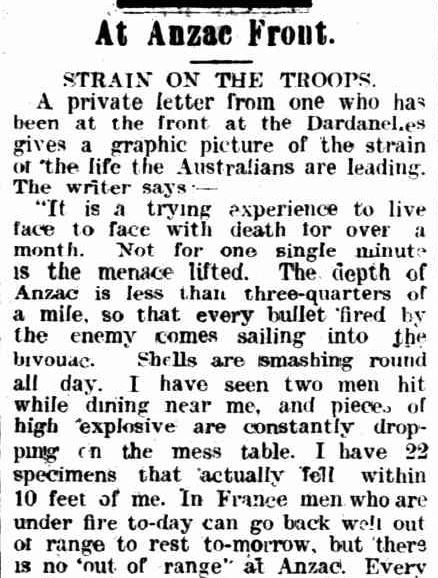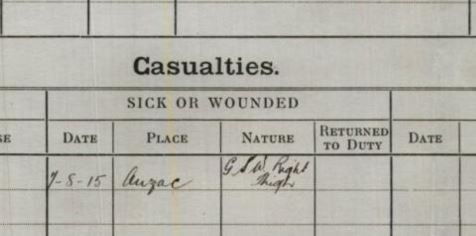Letters from the front were often published in Queensland newspapers during WW1, for an audience at home keen to hear the voices of those of those gone to war. The men and women writing them couldn’t give away much about where they were, or the movements of their contingent, lest their letters be destroyed by the censors.
Nonetheless, letters published in the newspaper revealed their struggle to stay sane in the face of the brutality they encountered daily. They oscillated between agonising accounts of battle, to cheerful reports of friendships that had been forged and how happy the troops were to receive care packages, often in the same letter.
Many letters have the underlying sense of wanting to assure their families back home they were surviving, as though telling their loved ones about the glimpses of humanity they witnessed would keep those moments in the forefront of their minds.
Searching Trove digitised newspapers for WW1 articles printed in Queensland newspapers in October 1915; I came across the headline, ‘At Anzac Front. Strain on the troops’ and could see the first sentence began with ‘A private letter..’. It was different to others I’d read, right from the beginning. Firstly, it was anonymous. Previous letters I’d come across in Trove were proudly published with their name, hometown and who they were writing to - their sister, father etc.
This author, described as ‘one who has been at the front at the Dardanelles’, went on to describe their experience of Gallipoli with harrowing density and acute turns of phrase:
‘Every inch of the place bristles with death and destruction. It is like standing on the edge of a precipice night and day waiting for someone to come along and shove you off.’
The last sentence, ‘Dante could write a new Inferno that would make his out of date book seem like a nursery rhyme’ was powerful enough that I became curious about the identity of this author and started looking for clues.
It’s obvious with its style and vocabulary the letter was written by someone with an education. It mentions friendships with several officers that had all perished. I found records that matched 3 of these men – Lieut. Col. Onslow, who died on 26th April 1915; Lieut. Col. Harris with the 5th Light Horse, who died on 31st July 1915 and Chaplain Gillison, who died on 22nd August 1915. All three men lost their lives in Gallipoli.
Special mention was made of Chaplain Gillison, parson of the St. Kilda Presbyterian church. I searched the newspapers and found he was mentioned in two other articles, one dedicating a section to the gallantry of his death. Both of these articles were written with a strong likeness to the descriptive style of the anonymous letter, and both were written by Australia’s official war correspondent, Captain C.E.W. Bean.
Another clue came in the form of injury; the anonymous letter mentions the author’s lucky escape from shell fragments that injured his right thigh. C.E.W. Bean’s WW1 military records mention one injury, a gunshot wound to the right thigh, on August 7th, 1915.
Researching Bean’s catalogue of articles in Trove digitised newspapers shows a convincing resemblance in narrative style as the anonymous letter, and his military records show he was in Gallipoli from the landing on April 25th 1915 until the last evacuations of Anzac troops in December, leaving us to imagine he could well have been the author. If so, why was it published anonymously when so much of his correspondence was branded with his name and title, emphasising his eminence? Many of Bean’s known articles were often as candid as this letter and the dissidence sensed by the reader was not uncommon in the press as the Great War dragged on into its second year.
Maybe when he mentioned, ‘how few smug politicians out our way realise what is going on’, the author felt more confident making such a statement anonymously. Or maybe, there were other men at Gallipoli who wrote as eloquently and honestly as Bean, whose diaries, letters and stories we are yet to discover.


An excerpt of C.E.W. Bean's medical records stating he received a gunshot wound to his right thigh, same as the unnamed author. Bean's miltary records can easily be found searching his name on the National Archives website.
Comments
Your email address will not be published.
We welcome relevant, respectful comments.